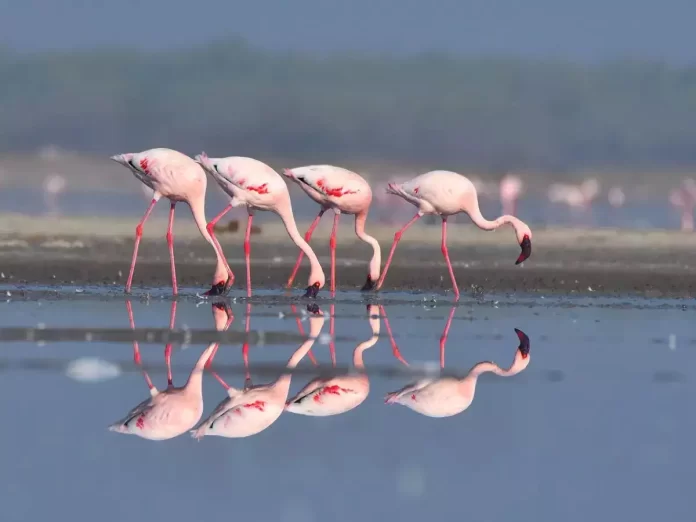A new study reveals that the future of Africa’s flamingos is under threat as the lakes where they congregate experience rising water levels, leading to a decrease in food supply for these iconic birds. Scientists warn that this trend jeopardizes the survival of the beloved species, which plays a vital role in the region’s biodiversity.
East Africa is home to three-quarters of the world’s lesser flamingos, with lakes in the region serving as crucial feeding and courtship grounds for over a million birds at a time. However, as these lakes expand to unprecedented levels, researchers have observed a decline in the production of the unique algae upon which flamingos rely for sustenance.
Read More: Tiny Seaweed Based Robots Offer Potential Cancer Treatment
Lead author of the study, Aidan Byrne, highlights the concerning impact of diminishing algae concentrations on flamingo habitats. He emphasizes that the birds are being driven away from their traditional feeding areas into unprotected regions in search of food, posing significant risks to their population.
The study, published in the journal Current Biology, utilized satellite imagery to monitor 22 soda lakes across East Africa, coupled with climate records and bird observation data spanning over two decades. Results indicate a significant decline in algae concentrations, particularly in lakes in Kenya, such as Nakuru, Lake Bogoria, and Lake Elmenteita.
The reduction in algal blooms directly correlates with a decline in flamingo numbers, posing economic challenges to tourism, as these lakes are popular tourist attractions known for their spectacular flamingo displays.
Researchers attribute the rising lake levels to increased rainfall associated with climate change, further exacerbating the threat to flamingo populations. Erratic and extreme rainfall patterns predicted for the region in the future are expected to intensify the problem, placing greater pressure on the species’ survival.
While flamingo habitats in East Africa are protected, monitoring and conservation efforts outside these areas remain challenging. The loss of these iconic birds would not only have devastating ecological consequences but also impact the region’s tourism revenue and cultural heritage.
As efforts to mitigate climate change become increasingly urgent, safeguarding the habitats of Africa’s flamingos emerges as a critical conservation priority to ensure the long-term survival of these magnificent creatures.



